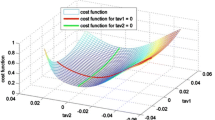Abstract
Electroencephalography (EEG) is widely used in cognitive neuroscience as a brain signal with high temporal resolution. Strong latency variability pervades cognitive EEG responses across single trials, but is not taken into consideration by the conventional averaging method yielding event-related potentials (ERPs). This trial-to-trial variability may strongly smear and mix ERP components and diminish their amplitudes, impeding proper identification of the spatiotemporal representation of brain activities reflecting specific cognitive subprocesses. Furthermore, rich dynamic information about single trials is lost in averaged ERPs. Here we propose a model of ERPs as consisting of temporally overlapping components locked to different external events or varying in latency from trial to trial as a foundation for a new ERP decomposition and reconstruction method, residue iteration decomposition (RIDE). RIDE obtains latency-corrected waveforms and topography of the components, and retrieves the latencies and amplitudes of the separated components in single trials. RIDE was tested with real data and provides new perspectives for investigating brain–behavior relationships using EEG data in latency-corrected reconstructed ERPs, separated components, and information about variability in single trials.
Access this chapter
Tax calculation will be finalised at checkout
Purchases are for personal use only
Similar content being viewed by others
References
Bayer, M., Sommer, W., Schacht, A.: P1 and beyond: functional separation of multiple emotion effects in word recognition. Psychophysiology 49, 959–969 (2012)
Ouyang, G., Herzmann, G., Zhou, C., Sommer, W.: Residue iteration decomposition (ride): a new method to separate erp components on the basis of latency variability in single trials. Psychophysiology 48, 1631–1647 (2011)
Ouyang, G., Schacht, A., Zhou, C., Sommer, W.: Overcoming limitations of the ERP method with Residue Iteration Decomposition (RIDE): A demonstration in go/no-go experiments. Psychophysiology 50, 253–265 (2013)
Ouyang, G., Sommer, W., Zhou C.: A toolbox for residue iteration decomposition (RIDE)—a method for the decomposition, reconstruction, and single trial analysis of event related potentials. J. Neurosci. Methods. (2014, in press)
Ouyang, G., Sommer, W., Zhou C.: Updating and validating a new framework for restoring and analyzing latency-variable ERP components from single trials with residue iteration decomposition (RIDE). Psychophysiology (2015 in press)
Polich, J.: Updating P300: an integrative theory of P3a and P3b. Clin. Neurophysiol. 118, 2128–2148 (2007)
Stürmer, B., Ouyang, G., Zhou, C., Boldt, A., Sommer, W.: Separating stimulus-driven and response-related LRP components with Residue Iteration Decomposition (RIDE). Psychophysiology 50, 70–73 (2013)
Tuan, P.D., Möcks, J., Köhler, W., Gasser, T.: Variable latencies of noisy signals: estimation and testing in brain potential data. Biometrika 74, 525–533 (1987)
Verleger, R.: On the utility of P3 latency as an index of mental chronometry. Psychophysiology 34, 131–156 (1997)
Woody, C.D.: Characterization of an adaptive filter for the analysis of variable latency neuroelectric signals. Med. Biol. Eng. 5, 539–554 (1967)
Acknowledgements
This work was partially supported by Hong Kong Baptist University (HKBU) Strategic Development Fund, the HKBU Faculty Research Grant (FRG2/13-14/022), the Hong Kong Research Grant Council (RGC) (HKBU202710) and Germany-Hong Kong Joint Research Scheme (G-HK012/12), the National Natural Science Foundation of China (Grant No. 11275027) to G.O. and C.Z., and the Germany-Hong Kong Joint Research Scheme (PPP 56062391) to W.S. This research was conducted using the resources of the High Performance Cluster Computing Centre, Hong Kong Baptist University, which receives funding from RGC, University Grant Committee of the HKSAR and HKBU.
Author information
Authors and Affiliations
Corresponding author
Editor information
Editors and Affiliations
Rights and permissions
Copyright information
© 2016 Springer Science+Business Media Singapore
About this paper
Cite this paper
Ouyang, G., Sommer, W., Zhou, C. (2016). Restoring Latency-Variable ERP Components from Single Trials: A New Approach to ERP Analysis with Residue Iteration Decomposition (RIDE). In: Wang, R., Pan, X. (eds) Advances in Cognitive Neurodynamics (V). Advances in Cognitive Neurodynamics. Springer, Singapore. https://doi.org/10.1007/978-981-10-0207-6_70
Download citation
DOI: https://doi.org/10.1007/978-981-10-0207-6_70
Published:
Publisher Name: Springer, Singapore
Print ISBN: 978-981-10-0205-2
Online ISBN: 978-981-10-0207-6
eBook Packages: Biomedical and Life SciencesBiomedical and Life Sciences (R0)




